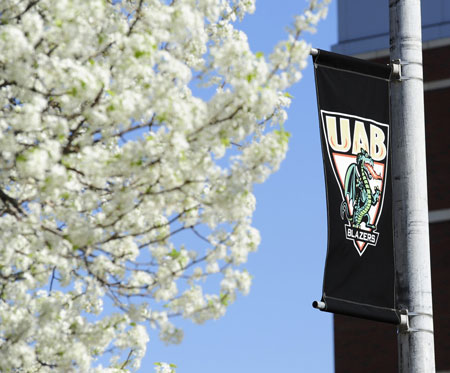Welcome to Mathematics
Mathematics has been a human endeavor for millennia. It has always been driven by two sources: the intrinsic beauty of numbers, shapes, and structures on the one hand and the necessity to solve practical problems in fields as diverse as atomic physics, computed tomography, and finance on the other.
 Accordingly, Mathematics, in its various facets, plays an important role for a large number of disciplines, and it is our mission at UAB to impart our students with the mathematical knowledge required in their respective fields. With a 5,000-year history, Mathematics is assumed by many people to be complete. New challenges are constantly posed within mathematics and from our increasingly technological society — our faculty is devoted to advancing knowledge in our field, as well as engaging our students in learning and applying mathematics in the pursuit of their goals
Accordingly, Mathematics, in its various facets, plays an important role for a large number of disciplines, and it is our mission at UAB to impart our students with the mathematical knowledge required in their respective fields. With a 5,000-year history, Mathematics is assumed by many people to be complete. New challenges are constantly posed within mathematics and from our increasingly technological society — our faculty is devoted to advancing knowledge in our field, as well as engaging our students in learning and applying mathematics in the pursuit of their goals
To achieve our mission, we offer degree programs on the Bachelor's, the Master's, and the doctoral level as well as a wide variety of courses for all students at UAB.
Undergraduate Programs
In addition to the traditional Mathematics major, we offer two concentrations:
- The Applied Mathematics and Scientific Computation track is designed for students who desire a strong connection with mathematical applications in the physical sciences, computer science, medicine and the biosciences, engineering, business, and elsewhere.
- The Mathematical Reasoning track is designed to develop a deeper level of understanding of mathematical thinking and mathematical ideas, understanding the role of inquiry and reflection in learning mathematics, and developing the ability to communicate mathematics to audiences at different levels. In particular, this track is appropriate for students interested in pursuing certification in mathematics at the middle school level.
For students pursuing other majors but who would like to continue their studies in Mathematics, we also offer a minor.
Mathematics Fast-Track Program
The Mathematics Fast-Track Program offers a deeper involvement with our subject. It allows a mathematics major can earn both a BS degree and an MS degree in mathematics in four to five years. Each individual Fast-Track student works with a mentor from the graduate faculty on a mathematics research project during every term. Students will usually begin taking graduate mathematics courses after the third year and are automatically admitted to the graduate program in the fourth year, if performing satisfactorily. Those who complete this program will be prepared for continued graduate work in mathematics and the sciences, or for careers in industry or government.
Graduate programs
The Department of Mathematics offers graduate programs of study leading to the M.S. degree in Mathematics or the Ph.D. in Applied Mathematics. In both programs we train students in mathematical rigor and the development of mathematical communication skills. The M.S. program prepares students not only for Ph.D. programs (at UAB or elsewhere) or a career in secondary or junior college level teaching but it also provides good preparation for students who go into business, industry, or government. In the past our students have been very successful in obtaining employment in such careers.
The Ph.D. program prepares students interested in an academic career in a university or a college as well as students interested in a career in business, industry, or government. We emphasize the importance of the applications by requiring a minor (four courses in a field outside mathematics, e.g., physics, computer science, or biostatistics), enhancing our graduates' competitiveness in the job market.
Research
Recognizing the cohesiveness of all branches of mathematics, we are particularly interested in the connections between pure mathematics and its applications. Our faculty specializes in the following fields:
- Differential Equations and Mathematical Physics
- Differential Geometry and Geometric Analysis
- Dynamical Systems and Ergodic Theory
- Numerical Analysis
- Probability and Statistics
- Topology (especially continuum theory)